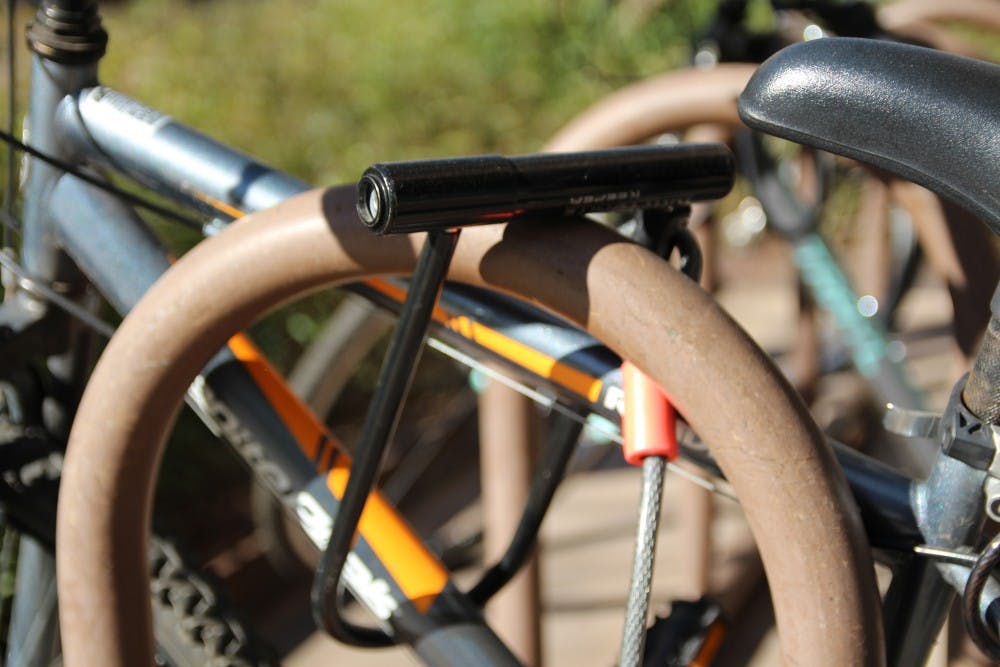 At first glance, the brown metal racks appear to be full of multicolored bikes. Upon taking a second glance the picture isn’t as perfect as you thought. It becomes noticeable that the turquoise bike to your left is missing a wheel and the shiny red bicycle a couple bikes over is without a seat. Remnants of a broken lock near an empty rack signify that one student’s mode of transportation may have found a new owner.
At first glance, the brown metal racks appear to be full of multicolored bikes. Upon taking a second glance the picture isn’t as perfect as you thought. It becomes noticeable that the turquoise bike to your left is missing a wheel and the shiny red bicycle a couple bikes over is without a seat. Remnants of a broken lock near an empty rack signify that one student’s mode of transportation may have found a new owner.
ASU students continue to search for a way to combat bike theft.
Bicycle theft has become more of an issue at the university as the number of students has increased, says ASU Police Department Program Coordinator Stewart Adams.
He says not as many are lost on the downtown campus, but about 20 to 50 bikes are stolen a month and approximately 400 bicycles are stolen a year among all four campuses.
Of these bicycles that have seemingly gone missing, most of them stay that way.
“They’re not recovered very often, but we do recover them,” Adams says. “Last semester, we recovered seven bikes, which is pretty good for us.”
Adams says registering the bikes through ASU or the city in which a student lives helps with the retrieval.
He says the thieves will steal anything; however, the more expensive bikes tend to be gone rather quickly.
“If you bring a $1,000 bike to campus and lock it up with a cable lock, there’s a good chance that will be stolen,” Adams says.
“Bikes are a commodity,” Grid Bike Share Operations Manager Giovanni Arico says. “Bikes are traded like a currency and there’s a lot of people that don’t have money, but they have the ability to steal bicycles.”
Even though bike theft continues to rise on-campus, there is a possible off-campus solution.
Grid Bike Share made its presence known in downtown Phoenix with its addition of bright green bikes that are available to rent.
Arico says members can rent a bike at any one of the racks with their account and pin numbers. The bikes contain GPS and track the number of minutes the bike has been in use; however, you are only charged once you lock the bike to a rack, he says.
Arico says these custom-built bikes have yet to be stolen.
“We’ve seen that people are trying to steal them, but they have yet figured out how to steal them,” Arico says.
He believes these bicycles have the potential answer to bike theft.
“I think that if we got more students riding or participating in the Bike Share program, it would certainly decrease the amount of theft that those students experience potentially to zero,” Arico says. “There may not be any bike theft if students started riding Bike Share bikes.”
For students who aren’t ready to turn in their bike, there are ways to prevent their bicycles from becoming another statistic.
“We find that the bike thief comes to campus with one tool to defeat one kind of lock and so if there’s two locks on a bike... we do recommend using a hard steal U-lock," Adams says. "But there’s also a cable or chain on the bike locking it separately—it’s a super system.”
Journalism senior Domenico Nicosia, who rides his bike to school everyday, says he’s not concerned about the bicycle theft because he’s careful about where he parks his bike.
“I use the U-lock and I lock up my front wheel," Nicosia says. "I keep it in the bike corral.”
The university has also made an effort to protect its students’ bikes.
“We’re putting more secure areas to park the bike,” Adams says.
One of those areas is the “bike valet on the east side of the Memorial Union that has someone watching the bikes,” Adams says.
Additionally, he says ASU has added new bike racks that lock the bike frame to the rack, which is easier.
Other measures taken by the university include putting out surveillance officers and using a bait bike, he says.
Adams says the bait bike has a tracking system installed in it, so it can be found if someone steals it.
“Hopefully, we’d like to have that track back to a place maybe where they’ve stored a bunch of bikes that they stole from campus to start breaking up those type of operations,” he says.
Despite the university’s latest efforts, some may feel it’s not their job to do so.
“Realistically, it’s a problem that’s going to occur in every city, so I’m not too sure how much of a responsibility it is for ASU,” Nicosia says.
Adams says ASU will continue to inform students about the ideal ways to secure their bikes, all the while adding more secure parking areas and surveillance.
Lastly, the ASU Police Department will send the message “if you steal a bike from campus there’s a high chance that you’ll be caught and arrested,” he says.
“Once that word gets to the bike thieves then they’ll be less likely to come to campus to steal bikes,” Adams says.
Reach the writer at shyde1@asu.edu and on Twitter @ShelbyHyde.




